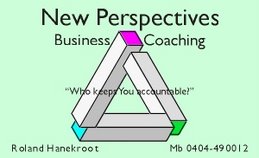The case for Multiple Personality
Disorder in business
Or how to be the Business Owner
By Roland Hanekroot, New Perspectives Business Coaching http://www.newperspectives.com.au/
Every business owner I have ever worked with has at some stage been stumped by a variation of the chicken or egg dilemma:
What comes first?
- I would like to spend more time developing my business, but I don’t know if I can afford to lose the time.
- I would like to employ extra staff, but I don’t know if I can afford the time to train them.
- I would like to spend more time generating leads and business, but if I am successful at that I don’t know if I will be able to handle the extra work.
- I would like to employ extra staff, but I don’t know if my cash flow will be able to handle it.
- I would like to develop my business processes and systems to be able to handle a lot more work, but maybe I should get that extra work first.
- I would like to employ extra staff, but I don’t know if I will still have enough work for them in 3 months.
- Etc.
So what really comes first?
First comes a realisation. It is the realisation that owning a business involves a particular type of schizophrenia or multiple personality disorder; you have to be three different people at once,
Michael Gerber in his E-Myth books refers to them as:
- The Technician (Who does the technical work, be it that of a carpenter, a salesperson or a lawyer)
- The manager (Who does the day to day management of the business: admin, finance, sales, managing people and processes etc)
- The Entrepreneur, or the business owner (Who does the business building work)
Suffering from schizophrenia is something you would not wish on your worst enemy and what is more, if you are intent on owning a business there is no cure.
You are simply going to have to accept the fact that all three personalities demand their time and space, equally.
Most business owners (including myself) know how and when to be the technician, how to do the technical work (the work of the business), that is how we got started, and who we have always been. Most of us also know something about being the manager and with a greater or lesser degree of efficiency we carry out the work of the manager, maybe a bit later than we’d like, or just pushing the deadlines. Often we feel this manager person gnawing at the back of our minds when we are being the technician on a daily basis, but generally we give him or her the required time and space, otherwise our businesses would have gone down the toilet ages ago.
The entrepreneur
Not many of us know how and when to be that third person though. We really just put her in the too hard basket most of the time. We can feel her fighting to get out of that basket sometimes, but there just is no time this week; that quote must be finished first and project “X” has fallen behind, and we are already a week late with our BAS return etc. So we keep the entrepreneur in her basket, put the lid on the basket, and sit on it for good measure. Maybe we let her out at night sometimes, or on a weekend every now and then, but certainly not during business hours when we have to make money and do the stuff we do, and do it and do it and do it….
Yet, the contradiction is that the most important work that you and only you as the business owner can ever do is the business building work.
The work of the business owner is not the work of the business. The work of the business owner is not the technical work, it is not the administration, and nor is it the sales or any of the other things that the business needs to carry out on a day to day basis.
The work of the business owner is the creative work of developing the business; it is imagining what you want the business to look like in 6 months, a year, 5 years. It is thinking time, it is planning; it is looking into the future and deciding how it will look. It is developing the strategies, the processes, the systems to make your vision a reality. It is creating the methods to measure the effectiveness of your systems and processes, it is learning and innovating, and deciding what the key indicators for the health of your business are, and where to get them when you need them.
This is the work that you and you alone are accountable and responsible for. Only by doing the Business Building work consistently as a matter of priority, will you be able to build your business into the thing you set out to create when you started it.
The challenge
So here is my challenge to you: As a first little step, beginning modestly, starting this week, with the new financial year coming up soon. How would it be to block out 2 hours a week from your diary, every week? Set in stone, come hell or high water, you are no longer available for clients, suppliers, meetings, employees, administration, phone calls, emails, or anything else. This will be your business building time, your thinking time, and your creative time.
You might find it confronting and feel guilty at first to block a slab of time out of your diary for this work, and on a workday as well! What if a client has an urgent issue for example? Well, I would like you to look at it this way; if your clients want to talk to you urgently at 3.00 am on the Sunday morning of your daughters first birthday, while on a skiing holiday with your family, would you take the call and have a meeting with them at that time? (If you answered “yes” you have greater issues than I can deal with in this article).
Build a bridge
So as my girlfriend says: Build a bridge…. (And get over it)…. simple as that. This weekly business building time is right up there with sleeping and holidays and your family. If you are not building your business, you are not building anything. To quote Michael Gerber again: “You have created a job for yourself with a fool for a boss”.
When you do start to step into the personality of the Business Owner you will find that this is one of the rare occasions when suffering from Schizophrenia is highly rewarding, and you will start to find the solutions to those typical business owners’ dilemmas.
One of the benefits of engaging a business coach is that the realities of being a business owner will become inescapable and the coach will help you integrate this personality and the work that belongs to him into your business life.
Further reading:
- “The E-Myth” series (E-Myth Revisited, E-Myth Mastery, E-Myth contractor, E-Myth manager, E-Myth physician) by Michael Gerber
- “Maverick” by Ricardo Semmler
- “It is not the big that eat the small, but the fast that eat the slow” by Jason Jennings and Laurence Haughton
- “The effective executive” by Peter Drucker







